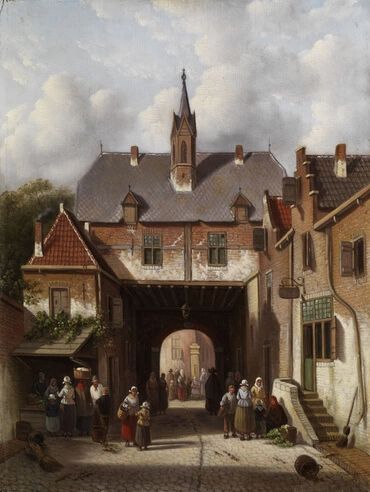Gate

Gates" in ancient times had a significance that does not hold in the modern world. Cities then were enclosed by walls for protection; gates in the walls let people in and out to do their business, but were also the weak points in the cities' defenses. In the Bible, cities on one level represent the minds of individual people. On a broader level, they represent beliefs shared by a community. The gates, then, represent openings where the Lord can feed us an understanding of truth and a desire for good. They also represent points where the hells can invade and sway us with false ideas and evil desires. We are kept in balance during our lifetimes, with influences from both the Lord and from hell. Ideally, we will over our lifetimes continue to invite the Lord farther and farther in and drive the hells back until ultimately the Lord can occupy our minds completely. And that point our belief in Him and His power and love will hold the gates and deny evil any entrance. As individuals, we at that point become angels. As communities, we at that point become part of the Lord's church. And at that point the gates become an entry point, introductory truths that allow people to enter churches and start bringing the Lord into their lives.
Arcana Coelestia#1197
1197. 'From whom Pelishtim came forth' means the nation which came from these, and which means a knowledge of the cognitions of faith and charity. This is clear from the Word where they are mentioned many times. In the Ancient Church all were called Philistines who spoke much about faith and who asserted that salvation lay in faith, and yet possessed nothing of the life of faith. Consequently they more than any others were called uncircumcised, that is, devoid of charity. (For references to them as the uncircumcised, see 1 Samuel 14:6; 17:26, 36; 31:4; 2 Samuel 1:20; and elsewhere.) Being such as they were they inevitably made cognitions of faith matters of memory, for cognitions of spiritual and celestial things, and the arcana of faith themselves, become purely matters of memory when a person who is acquainted with them is devoid of charity. Things of the memory are so to speak dead if the person is not such that he lives according to them from conscience. When he does live according to them from conscience things of the memory are in that case matters of life as well, and only then do they remain with him for his use and salvation following life in the body. Knowledge and cognitions are of no value to anyone in the next life, even though he may have known all the arcana that have ever been revealed, if they have made no impact on his life.
[2] Throughout the prophetical parts of the Word 'the Philistines' means people such as these, as they do in the historical sections of the Word, as when Abraham sojourned in the land of the Philistines and made a covenant with Abimelech, the king of the Philistines, Genesis 20:1-end; 21:22-end; 26:1-33. Because the Philistines here meant cognitions of faith, and because Abraham represented the celestial things of faith, he sojourned there and made a covenant with them. So likewise did Isaac, who represented the spiritual things of faith. But Jacob did not do so because he represented the external features of the Church.
[3] That 'the Philistines' means, in general, knowledge of the cognitions of faith, and in particular people who make faith and salvation reside in cognitions alone which they make matters of memory, becomes clear also in Isaiah,
Rejoice not, O Philistia, all of you, that the rod which smites you has been broken, for from the serpent's root will come forth an adder, and its fruit will be a flying prester. Isaiah 14:29
Here 'the serpent's root' stands for facts, 'an adder' for evil arising out of falsities based on facts. 'The fruits of a flying prester' is their works which, because they are the product of evil desires, are called 'a flying prester'
[4] In Joel,
What are you to Me, O Tyre and Sidon, and all the borders of Philistia? Are you rendering Me a recompense? Swiftly and speedily I will return your recompense upon your own head, inasmuch as you have taken My silver and My gold, and My good and desirable treasures you have carried into your temples, and have sold the sons of Judah and the sons of Jerusalem to the sons of the Javanites, 1 that you might remove them far away from their border. Joel 3:4-6.
What 'the Philistines' and the whole of Philistia, or 'all its borders', are used to mean here is plain. 'Silver' and 'gold' here are the spiritual and celestial things of faith, 'good and desirable treasures' cognitions of them. 'They carried them into their temples' means that they were in possession of them and proclaimed them. 'They sold the sons of Judah and the sons of Jerusalem' however means that they possessed no love and no faith. In the Word 'Judah' is the celestial element of faith, and 'Jerusalem' the spiritual element deriving from it, which were 'removed far away from their borders'. Further examples exist in the Prophets, such as Jeremiah 25:20; Jeremiah 47:1-end; Ezekiel 16:27, 57; 25:15-16; Amos 1:8; 19; Zephaniah 2:5; Psalms 87:4; and the people of Caphtor are mentioned in Deuteronomy 2:23; Jeremiah 47:4; Amos 9:7.
脚注:
1. i.e. the Greeks






